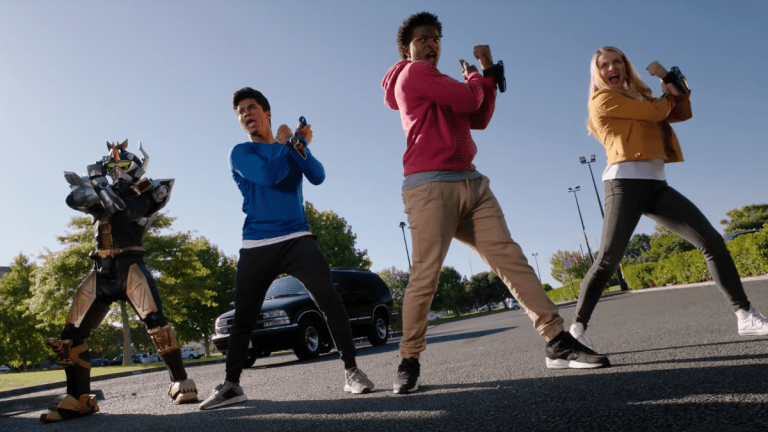Power Rangers Beast Morphers Season 2 Episode 6 Review: The Blame Game
Another episodic installment of Beast Morphers makes us wonder if we’ve been judging the season the wrong way.

This POWER RANGERS BEAST MORPHERS review contains spoilers.
Power Rangers Beast Morphers has fallen into a bit of a rut, hasn’t it? It’s not bad by any stretch of the imagination but it’s not doing much to stand out. Occasionally we’ll get an episode like ‘Artist Anonymous’ but by and large this season (and last season) have all been mediocre. They have some strong ideas that could make for compelling stories but instead we get episodes like this.
‘The Blame Game’ should be a winner since it focuses on the best character in Beast Morphers, Steel. Steel has been a joy from his very first appearance and even in a weaker episode he shines. Here though I’m not quite sure what they were doing with him. I get that he had to learn that not everyone deserves a strict punishment but… what was the point?
What does this tell us about Steel? That he doesn’t quite understand human interactions? That’s fine and could lead to a lot of comedy but here it doesn’t add up to much. He’s mean to a few members of Grid Battleforce, realizes he’s wrong, and then apologizes. He barely plays a part in Nate getting taken over by the puppet, which could have at least been an emotional hook for the episode. Yeah it would have basically been the same hook as last week but at least Beast Morphers has done a lot to make us care about the Nate and Steel relationship.
Instead Steel realizes he made a mistake with that Cole guy thanks to seeing the footage of Nate getting mind controlled. It’s hollow. It makes what should be an exciting sequence, Nate fighting Devon, feel like nothing special instead of a big moment. Mind control plots live or die based on the reasons why the person got mind controlled and Steel, the focal character of the episode, barely plays a part in it.
What does this sort of plot say about Power Rangers Beast Morphers? It’s easy to gripe and moan about why they aren’t doing a long running serialized arc about Evox or really any of the other characters. Why are they doing stand alone stories when there’s so much potential for more?
The simple answer is that episodic storytelling is what sells. Former Senior Vice President of Power Rangers Franchise Development and Producer Brian Casentini explained this to ComicBook.com in an interview just after he left Hasbro.
“I am a big fan of serialized storytelling, but most broadcasters across the globe want more episodic storytelling for scheduling ease.”
He went on to say that they found a “really great balance” with Beast Morphers which, to be fair, has had a few more serialized elements. They just feel very sequestered to a select few episodes.
Many will instantly point to other successful kids shows that do use serialized storytelling but let’s remember that some of the most popular kids shows out there still use episodic storytelling. Spongebob, Teen Titans GO!, etc. Episodic storytelling sells because broadcasters can run the episodes whenever they want and don’t have to worry about viewers missing any big story beats that could make them tune out.
So Beast Morphers is going to be episodic whether fans like or not. That’s what it was designed to do. We can moan about what we wish the show was but we should look at it for what it is; a mostly episodic series with a few serialized elements.
Does looking at Beast Morphers in that light make it better? A little, but even taking it on an episode-by-episode basis the plots are still mostly average. Again, not bad, just average. They usually lack a great emotional hook that makes the conflict feel personal to the characters. When the show does work, such as the absolutely amazing ‘Rewriting History,’ it does what Power Rangers does best. It juxtaposes the absurd with genuine moments of heart.
For a while it feels like Power Rangers has shied away from those absurd elements but that’s where it can shine. I don’t mean forced slapstick comedy, I mean really playing around with the campiness of Power Rangers. It’s already got rubber monsters fighting teens in spandex. Lean into that absurdity! Play up characters like Steel and his lack of understanding human emotions. You can tell fun stories that way and as long as you tie in a relatable and grounded emotion. Zaniness for the sake of zaniness gets old fast. You need something grounded to make the elevated comedy work.
I always go back to the second half of Power Rangers Turbo for great examples of this. ‘Trouble By The Slice’ is completely absurd, the Rangers get baked in a giant pizza, but there’s still a core element of Justin finally feeling like he can act like a kid again. Those stories were also mostly episodic which proves that kind of writing doesn’t have to be an albatross around Beast Morphers’ neck.
Power Rangers Beast Morphers can make episodic stories work. It just needs to find stronger emotions and conflict in them.
